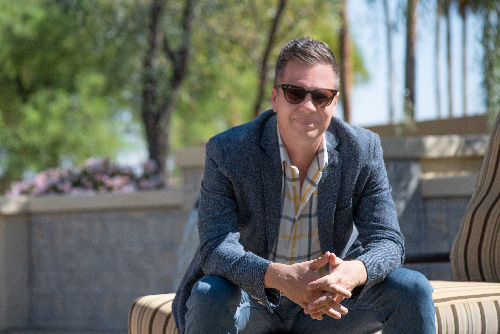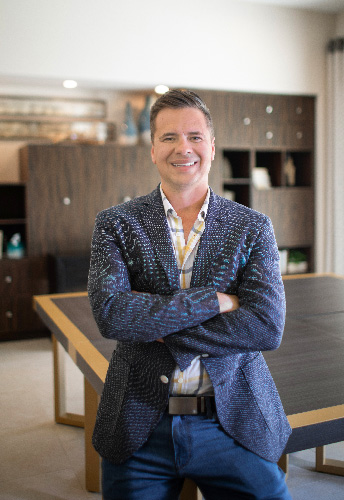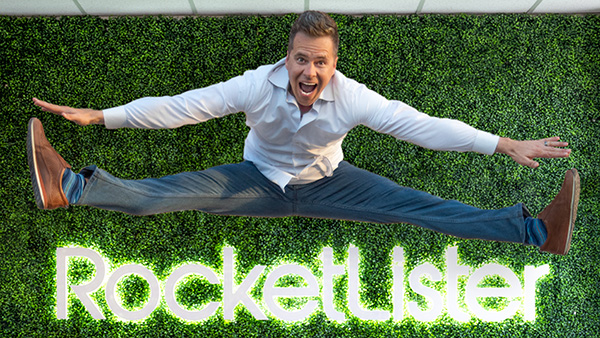Typically, the terms “risk taker” and “cautious” are not applied to the same person, but Ryan Robson had made a career out of assuming both of these traits when it comes to his real estate career and business decisions.
Robson has owned Rocket Lister since November 2020. The multi-state company provides real estate agents with services such as photography, videography, sign and lockbox installation, and more. Rocket Lister’s mission is to provide agents a high quality, consistent product and an out-of-this-world customer experience.
“We have 13,000 agents using our service, and we shoot 40,000 homes a year,” Robson said. “If you look at the total number of listings in a year for a market, 10 percent of the agents in the market do 80 to 90 percent of the listings. And those that have figured it out know that they should not be doing their own real estate photography with their own camera or a cell phone. We are speaking to the agent that has already figured out that real estate photography is important, but may not be getting the best experience or results from the photographer they’re working with.”

Ryan Robson, Owner of Rocket Lister
Purchasing Rocket Lister is the latest of many big swings Robson has taken since he entered the real estate industry. It’s the risk-taker part of his persona. He doesn’t just throw cash at new ventures, however. Robson takes a thoughtful and calculated, although fast, approach to his real estate decisions. The cautious side of his brain stems from the years he spent sharpening his accounting skills.
See, where Robson is, and plans to go, is the direct result of where he has been.
A Real Estate Family
Robson saw the good, bad, and ugly sides of the real estate industry well before he went to college. He grew up with his mother, who was a real estate agent. They saw ups and downs when it came to income and spent time living in various places and avoiding creditors. Meanwhile, Robson’s father was a very successful real estate developer. So, Robson got the real estate experience and education watching his mom as an agent, and saw what was financially possible from his dad’s success.
“In my mind, I had this idea that being successful was possible and it’s in my genes,” Robson said. “My dad did it; why can’t I do it? I did not want to be poor because I saw my mom being poor and the struggles [that came with it.]
I got to experience the pain of not having money; that’s where a lot of my drive came from.”
At 18, Robson had made up his mind. He wanted to go into real estate like his parents. His dad convinced him to learn how to walk before he could run, however. Rather than jump into the real estate arena feet first, Robson’s dad suggested he study accounting or finance. Then if he wanted to work in real estate later, he could learn about that industry in the future.
“That was hard for me because I was a young entrepreneur and visionary,” Robson said. “I wanted to go out and rule the world—just go out and take over. At a young age, my dad convinced me to build a foundation first and then expand on it. So, I studied accounting in school.
Avoiding real estate right out of school was perhaps some of the best advice Robson could have received. His other pre-real estate activities included serving a two-year mission for his church, which Robson said helped him mature and develop more emotional intelligence. He lived in Spain for two years and spent some time doing out-of-the-box sales. Meanwhile, his accounting education and work helped him slow down and understand the importance of spreadsheets, structure, and skills he didn’t have beforehand. Working in accounting also gave Robson a better idea of what he didn’t want to do.
“I did accounting for four years and it wasn’t a long-term fit for me,” Robson said. “My personality is in the sales, marketing, and the real estate world, accounting did not fit well with that.”
The Importance of Playing it Safe
It didn’t take Robson long after he left the accounting world to learn why sometimes it’s best to be conservative with money. He started his post-accountant life as a hard money lender. One of Robson’s roles was to underwrite loans and make sure what the borrowers were asking for and their property valuations were accurate. Unfortunately, Robson was hired in 2007, right before the real estate crash.
“From 2007 to 2009, I was watching a lot of really successful people lose money left and right,” Robson said. “I was getting paid $80,000 a year and all of my friends that had done really well had all gone bankrupt. I was underwriting hundreds of deals a month, which was a great experience for me because it forced me to be conservative since we were in a falling market.”
The combination of the job experience and being conservative with his money paid off for Robson. In 2009, Arizona’s Department of Financial Institutions shut down his boss’s company due to a filed lawsuit. Robson’s boss was cleared of any wrongdoing, but in the six months it took to sort out everything, he was forced to find another job. Fortunately, Robson had put away a fair amount of money ($40,000) to buy himself a little time. But, it only took a week or two for him to get bored and want to get back to work.
“I felt like I had to do something with life; I could not just retire with $40,000,” Robson said.
A Real Estate Career is Born
Robson’s fortunes changed when he met a friend who had just lost $1 million in the market crash and started doing short sales.
“I thought for sure this would be the way to go,” Robson said. “I joined up with him because he had the experience and I had the vision.”
Robson and his friend took the $65,000 they had between them and did their first flip in 2010. They purchased a house for $50,000 and sold it for $70,000. They did 38 flips that year, 70 the following year, and from 2012 to 2018 averaged over 100 flips a year.
When people ask Robson which career path they should take, he asks them the same thing—what are they passionate about? He recognizes that people might want to get into the most lucrative real estate arenas, but he understands that the true reward comes from not only enjoying the work one does, but also to liking the people that they serve.
“If you find yourself complaining about homeowners all day long, and you’re not really passionate about helping homeowners, you probably shouldn’t be a real estate agent,” he said. “If you find yourself complaining about this, that, or the other, or not feeling a passion to serve these people, you might be in the wrong industry.”
Robson practices what he preaches. In 2018, he branched out from his house-flipping business and started a real estate brokerage. Robson built his brokerage and in two years it was handling 30 listings a month, and he managed to sell it for seven figures.
“Not only did I figure out the house-flipping world, where we’re doing hundreds of deals a year, I proved to myself that I could build a brokerage of agents and generate 30 listings a month and then sell the company,” Robson said. “That was a cool accomplishment for me. I love serving people, and going out of my way to build rapport. House flipping really does not provide that feeling.”
The Art of Risk Management
Putting every dollar he had into a house-flipping venture and building a real estate brokerage from scratch were just two of the risks Robson has taken in his real estate career. Purchasing Rocket Lister is also on that list, but Robson perhaps made an even riskier move leading up to the acquisition—breaking off from a long-time partnership.
Robson and his business partner worked almost exclusively with handshake deals for years. Then in late 2017, his wife mentioned how one of her mentors said in every relationship, one should always leave more than they take. The notion stuck with Robson because he realized he was putting in more than he took from his business relationship.
“The business was so much more important to me than how much I was gaining financially from it,” he said. “[My thought was] what could I do to grow the business, which was helping him out, putting in more time and sacrificing? At some point that started to weigh on my wife.”
Robson was not concerned at the time that he was putting in more time than his business partner. However, his wife convinced him the only way for him to move further ahead was to do so on his own. She reminded him of all of the different businesses he wanted to do and the ideas that he had—and that he’d always have to bring his partner in 50/50 if he stayed with him.
“She convinced me to break off that partnership, which was a hard decision for me because loyalty is one of my core values,” Robson said. “I’m a very loyal person to the extent that I don’t even have to have something in writing with you. If I shake your hand, I’m going to follow through with it.”
After being a Rocket Lister customer for 10 years, Robson expressed interest in purchasing the company. He spoke to the previous owner about the ins and outs of the business, the process and the challenges that came with it. Despite all of this, Robson still saw an opportunity. For Robson, seeing the company operate up close for a decade, made it feel like less of a risk to buy. But over the years, Robson has developed a few other safety nets to help him minimize his risks.
One of those safety nets is people. Robson believes if he brings in the right people, his business can thrive, whether it’s the brokerage he built and sold, his thriving cabinet company (Cabco Cabinets), his online mastermind for real estate investors (Next Level Mastermind), or an acquired enterprise like Rocket Lister.
“I live in the future, which is a dangerous place to live,” he said. “But I love what the future could bring. I have to ask myself if I have it in me, and if I can find the right people, which is the most important key to success that I’ve had. I had the right partner in the real estate brokerage that I bought and sold.”
Robson also acknowledged how critical a real estate agent’s first hire is. When he first started his brokerage, Robson’s initial hire was a transaction coordinator and executive assistant. They were able to handle all of the tasks that Robson could not. It’s the same sales approach he takes when trying to get real estate agents to hire Rocket Lister.
“Let us handle your listing and marketing services by doing photography and content for your listings,” he said. “From a risk perspective, you get to take more risks when you’re not tied down handling details for things you’re not good at.”
Money is another effective safety net Robson has employed to help him minimize risk. When he wasn’t flipping houses, creating a mastermind group, starting a brokerage, or acquiring Rocket Lister, Robson built a 100-unit portfolio of rental properties. Those properties bring him approximately $50,000 a month in passive income.

Ryan Robson, Owner of Rocket Lister
“What that allows me to do, as far as risk management, is to take on a lot more risk because that money is coming in whether I like it or not,” Robson said. From a risk management perspective, I think passive income is probably one of the most attractive subjects for real estate investors and real estate agents. If you want to take big risks and buy companies like I did with Rocket Lister, and start a cabinet company and take these risks, then real estate, in my opinion, is less risky than a business because there’s collateral.”
No matter how many safety nets one builds, there’s still likely to be some risk involved in any big career or business move. Those who are willing to take those risks will increase their chances of having success. One of the biggest mistakes Robson has seen is people take too much time between coming up with their idea and then putting it into action. Their risk tolerance is so low that they stay in the “idea” phase for too long and never get to the execution part.
“I think my superpower is going from idea to execution very quickly,” Robson said.
“There’s this amount of time that exists between your idea and execution, and my goal is to be super fast at that. That doesn’t mean that you don’t look at the data—that’s the accounting part of my brain.”
“Very few people have what it takes to swing the bat at the fast ball of entrepreneurship—it’s a really short list. That’s a problem, don’t get me wrong, but really the big problem that people have is knowing what to do after they hit the ball.”























0 Comments